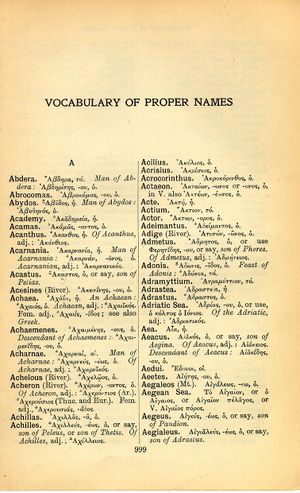Abdera
Θησεύς τινʹ ἡμάρτηκεν ἐς σʹ ἁμαρτίαν; (Euripides, Hippolytus 319) → Hath Theseus wronged thee in any wise?
English > Greek (Woodhouse)
Ἄβδηρα, τά.
Man of Abdera: Ἀβδηρίτης, -ου, ὁ.
Latin > English (Lewis & Short)
Abdēra: ōrum, n., and ae, f., =Ἄβὀηρα.
I Abdera, a town on the southern coast of Thrace, not far from the mouth of the Nestus, noted for the stupidity of its inhabitants. It was the birthplace of the philosophers Protagoras, Democritus, and Anaxarchus; n., Liv. 45, 29, 6; Gell. 5, 3, 3; f., Ov. Ib. 469; Plin. 25, 8, 53, § 94 dub.; 4, 11, 18, § 42: hic Abdera, non tacente me, here was Abdera itself, Cic. Att. 4, 17, 3 (4, 16, 6).—
2 Folly, stupidity, madness, Cic. l. l. (cf.: id est Ἀβὀηριτικόν, i. e. stupid, id. Att. 7, 7, 4, and Arn. 5, p. 164; Juv. 10, 50; Mart. 10, 25, 4).—
B Hence, derivv.
1 Abdērīta and Abdērītes, ae, m., =Ἀβὀηριτς, an Abderite: Democritus Abderites, Laber. ap. Gell. 10, 17: Abderites Protagoras, Cic. N. D. 1, 23, 63; cf. id. Brut. 8: de Protagora Abderita, id. de Or. 3, 32, 128: Abderitae legati, Liv. 43, 4, 8; cf. id. § 12 sq.; Vitr. 7, 5, 6; Just. 15, 2 al.—
2 Ab-dērītānus, a, um, adj., of Abdera, meton. for stupid, foolish: Abderitanae pectora plebis habes, Mart. 10, 25, 4.—
II A city of Hispania Baetlca, on the southern coast, now Adra, Mel. 2, 6, 7; Plin. 3, 1, 3, § 8.

